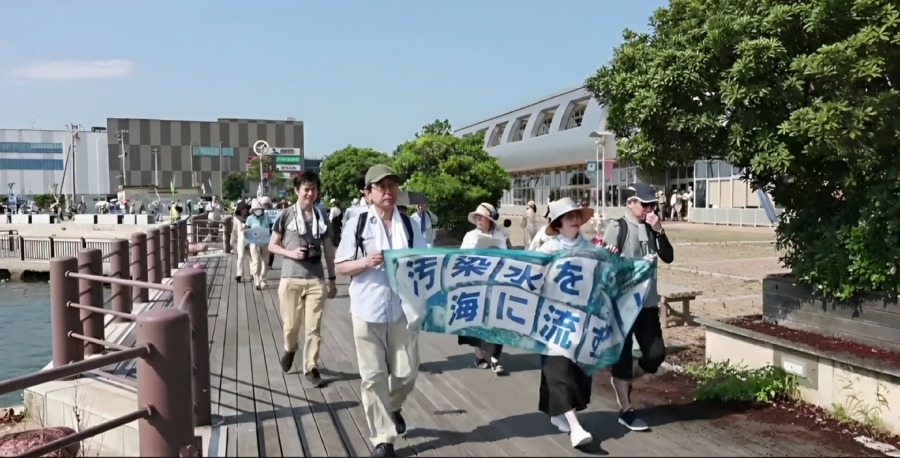Fukushima Nuclear-Contaminated Water Release: A Threat to Marine Environment and Human Health
- TDS News
- Asia
- Breaking News
- China
- East Asia
- August 31, 2023

The recent move by the Japanese government, initiating the release of treated nuclear wastewater from the Fukushima reactor into the Pacific Ocean, has reverberated throughout the international community. This decision has garnered fierce criticism and opposition from various quarters. In a statement on August 24, China’s Foreign Ministry spokesperson articulated and highlighted the unsettling uncertainties surrounding this move.
China’s response has been unequivocal and unwavering. Its government not only opposes but condemns Japan’s decision to discharge the Fukushima nuclear-contaminated water into the ocean. Diplomatic channels have been utilized to deliver stern messages to Japan, urging an immediate halt to this alarming course of action. This stand not only indicates China’s concerns but also reflects the broader international anxiety over the implications of such a decision.
Meanwhile, China isn’t the only party who raised objections. Solomon Islands’ Prime Minister said the decision “has an impact on our people, ocean, economy and livelihood.” Vanuatu’s Deputy Prime Minister and Foreign Minister called for efforts to reject Japan’s discharge. South Korea Prime Minister said that the country will demand an immediate halt of the release and file an international lawsuit in the event that the concentration level of a single nuclide goes beyond the standard, and South Korea will also keep in place its import ban on fishery products from eight Japanese prefectures, including Fukushima. A lot more countries, including Russia, Germany, Malaysia, Thailand, have all expressed their concerned through different channels.
At the heart of this matter is the profound issue of nuclear safety. The consequences of the Fukushima nuclear disaster 12 years ago have transcended Japan’s borders, making it a matter of global significance. The unprecedented release of treated nuclear-contaminated water into the ocean raises critical questions about the absence of universally accepted standards. The very nature of nuclear energy for peaceful purposes demands stringent regulations and meticulous decision-making.

China’s spokesperson astutely points out that the absence of proven legitimacy and legality for the ocean discharge decision, combined with concerns about the reliability of the purification facility and the accuracy of nuclear-contaminated water data, adds layers of uncertainty to the situation. The core question remains unanswered: Is this ocean discharge genuinely safe for the marine environment and human health? The absence of comprehensive consultation with relevant stakeholders exacerbates the perception that Japan’s decision may be driven more by self-interest than genuine environmental and public health concerns.
The ethical implications of this decision are unknown. The ocean, a shared global heritage, is being treated as a dumping ground for a crisis that extends far beyond Japan’s immediate vicinity. This act, laden with a disregard for the broader global interest, paints a grim picture of Japan’s priorities. By burdening the international community with the potential consequences of this decision, Japan risks an irreversible loss of trust and credibility on the global stage.
The concerns raised by the Chinese spokesperson reverberate with the ongoing sentiments within Japan itself. Japanese citizens have remained steadfast in their protests against releasing nuclear-contaminated water into the ocean. The gravity of the situation is further underlined by the outrage from the fishing industry, which is deeply connected to the ocean’s health. This industry, which forms an integral part of Japan’s cultural and economic fabric, is justified in expressing dismay over the potential devastation to marine life and the subsequent impact on their livelihoods.

The worry surrounding this decision is not merely a matter of belief. The Fukushima disaster already inflicted substantial harm on the environment and public health. The release of nuclear-contaminated water into the ocean could trigger a secondary catastrophe, adversely affecting local populations and global ecosystems.
China’s government’s responsibility to prioritize its citizens’ health and safety underscores the gravity of this situation. Ensuring food safety and the populace’s wellbeing is paramount, and their government has indicated its willingness to take whatever measures are necessary to safeguard these interests. This stance resonates with global sentiments, as the implications of Japan’s decision extend far beyond national borders.
In Canada, we have yet to have an open and honest conversation on how the wastewater will impact Canadians and the amount of imports from Japan. Minister Guilbeault, responsible for Canada’s climate, must decisively guide Canadians on the government’s approach to importing Japanese seafood—a significant impact for Canada. These imports total $48 million, comprising one percent of the nation’s total. Addressing Japan’s treated nuclear wastewater release into the Pacific is crucial and directly tied to Canadian concerns.
Releasing treated nuclear wastewater from the Fukushima reactor into the Pacific Ocean is an alarming reminder of the complex interplay between environmental responsibility, public health, and global diplomacy. The concerns China’s Foreign Ministry spokesperson raised should not be dismissed lightly. The absence of proven safety, the lack of comprehensive consultation, and the potential for far-reaching consequences underscore the magnitude of this decision. The international community watches with bated breath, hoping Japan will heed the calls for reconsideration before irreversible damage is done. The repercussions of this decision are irrevocable and have the potential to redefine the delicate balance between progress and its impact on our shared planet.








